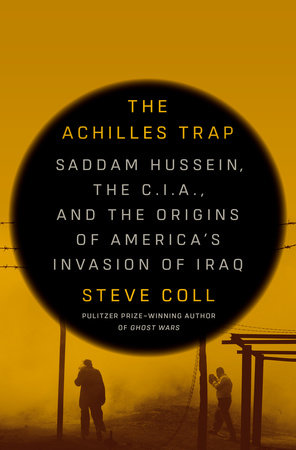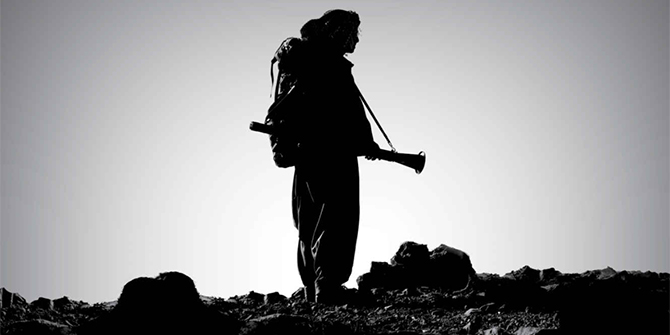by Jenifer Vaughan

As the spectacle of operation ‘Shock and Awe’ unfolded, I was ensconced in CNN’s control room helping to orchestrate the flurry of live shots from reporters across the globe. Amidst the chaos, a palpable sense of anticipation permeated the room as a massive aerial assault began on Iraq. When would US and British troops expose Saddam’s arsenal of weapons?
It was a moment like many others that encapsulates the broader discourse surrounding the ignorance and complicity of many in the lead-up to the conflict, a subject that has been dissected at length since. However, while there has been intense scrutiny of the Iraq War and intelligence failings, a new and noteworthy book is published, offering a distinctive perspective.
In The Achilles Trap, Saddam Hussein, the C.I.A., and the Origins of America’s Invasion of Iraq, Steve Coll argues that Saddam’s adversaries overlooked crucial subtleties of his character and governance. As evidenced by America’s catastrophic invasion, driven by the false premise of eradicating non-existent weapons of mass destruction, it becomes apparent that Saddam’s complexities eluded comprehension by Washington’s policymakers and intelligence community, even amidst heightened risks, Coll concludes.
The objective Coll, a Pulitzer Prize-winner, sets forth in The Achilles Trap is to embark on an exploration of this fiasco in understanding, endeavouring to broaden the narrative surrounding the genesis of the 2003 US invasion, which then UN Secretary-General Kofi Annan deemed illegal and a breach of the UN charter, by enhancing Saddam’s perspective and incorporating significant new revelations. He masterfully succeeds in this.
The book is divided chronologically into three parts commencing with Saddam’s ascent to power in 1979 and the inception of Iraq’s covert nuclear-weapons program shortly thereafter; the 1991 Gulf War, and the subsequent dispute regarding Iraqi disarmament; and the pivotal clash with the United States post-9/11 and the years that followed.
Coll, in one of the most captivating sections, scrutinises how the onset and unfolding of the Kuwait invasion reshaped Saddam’s global standing. The Iraqi leader’s actions, occurring amidst the shifting dynamics of the post-Cold War era, not only misaligned with emerging alliance opportunities, but also coincided with the proliferation of cable and satellite television, which facilitated widespread news coverage, thereby thrusting Saddam’s propaganda into the international spotlight, Coll writes.
The work is anchored in an abundance of first-hand accounts, drawn from more than one hundred interviews with key individuals involved in the affairs, notably including Jafar Dhia Jafar, leader of Iraq’s nuclear program, as well an array of sources, as reflected in the book’s footnotes. Through this diverse range of perspectives, Coll intricately weaves together a thorough depiction of Saddam and pivotal events, exploring nuanced complexities and presenting meticulous research within a captivating read.
The narrative intricacies, both substantial and minute, maintain interest throughout what is a lengthy book. For instance, the details provided by Coll surrounding the episodes at the end of the First Gulf War, involving Baghdad’s choice to clandestinely eliminate significant portions of Iraq’s WMD arsenal and infrastructure without maintaining thorough documentation, are particularly engaging. That, as Coll notes, emerges as one of the most consequential moments in Saddam’s and America’s journey towards catastrophe.
The Achilles Trap is rich in vivid character portrayals and compelling dialogue, as well as depictions of profound arrogance, immense cruelty, and remarkable bravery. For example, in another poignant chapter, the narrative vividly illustrates Saddam’s decision to unleash his fury upon the Kurdistan region in the Anfal campaigns, capturing the profound consequences of this policy as communities suffer devastation and individuals are forced to confront their mortality.
As Coll notes, The Achilles Trap holds significance in our current era characterised by the rise of authoritarian leaders; in a time where democracies across the globe are under strain, understanding the often erratic and opaque decision-making processes of isolated rulers becomes crucial, Coll argues.
Although demonstrating counter narratives poses challenges, as the book’s author also remarks, and hindsight benefits from clarity, it is hoped The Achilles Trap garners widespread readership to mitigate the recurrence of similar catastrophic errors in the realms of warfare and diplomacy.
[To read more on this and everything Middle East, the LSE Middle East Centre Library is now open for browsing and borrowing for LSE students and staff. For more information, please visit the MEC Library page.]






